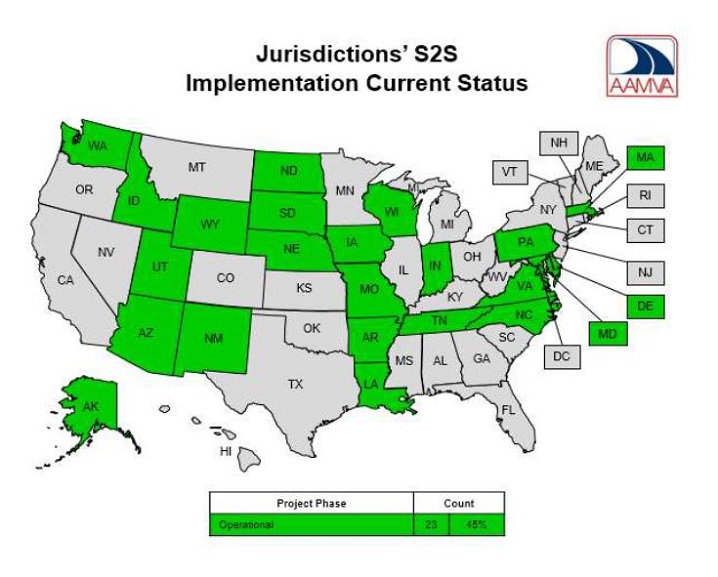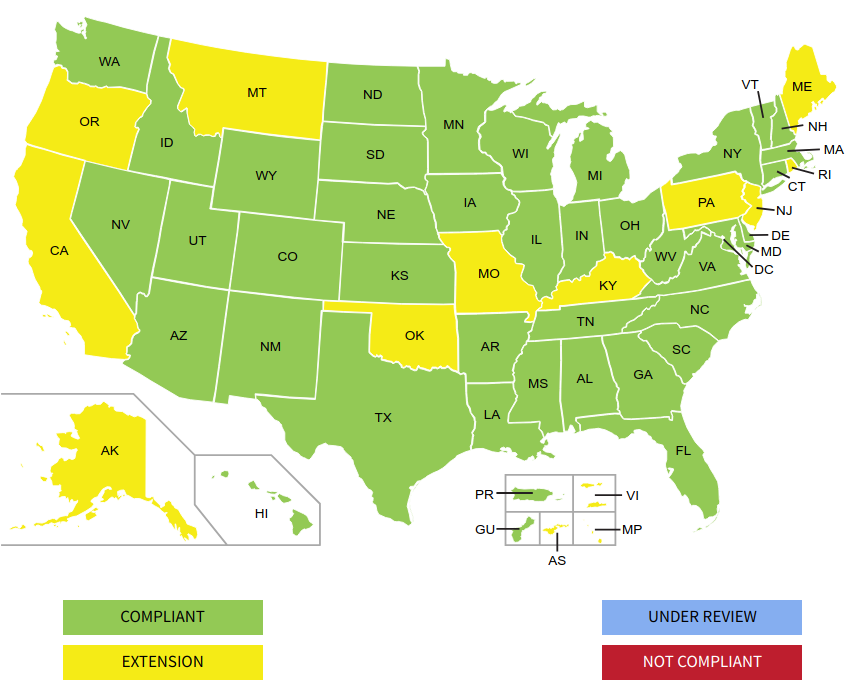DHS continues to extort participation in REAL-ID database
If there is one truth hiding in the forest of DHS lies about the REAL-ID Act of 2005, it’s that the DHS doesn’t want to cause riots at airports by subjecting residents of disfavored states to more intrusive searches and “ID verification” interrogation when they travel by air.
The goal of the REAL-ID Act is to intimidate states into adding their residents drivers’ license and state ID data to the SPEXS national ID database, through threats to harass residents of states and territories that aren’t sufficiently compliant.
Like any extortionist, the DHS wants its victims to submit, and doesn’t really want (and may not even be prepared) to carry out its threats.
But what will the DHS do when its bluff is called by states or territories that are either unwilling or unable to comply?
Today, April Fools Day, we’re seeing the latest test of the answer to this question, with the US Virgin Islands as the target of DHS threats.
In almost all cases to date, the DHS has backed down, by exercising its standardless discretion under the REAL-ID regulations either to certify that states are “compliant” even when they don’t comply with the statutory criteria in the REAL-ID Act, or to grant extensions of time to comply.
With the latest upload to SPEXS of data about Missouri residents completed on March 26, 2019, data from 23 states is now included in the national REAL-ID database:
 [States participating in the SPEXS national ID database]
[States participating in the SPEXS national ID database]
Compliance with the REAL-ID Act requires making information about all state-issued drivers’ licenses and ID cards, including “noncompliant” licenses and IDs, available to all other states — which is only possible through participation in SPEXS.
So no states or territories other than the 23 shown in green in the map of SPEXS participants above could possibly be deemed “compliant” with the REAL-ID Act.
But in its standardless discretion, the DHS has “certified” 42 of the 56 states and territories subject to the REAL-ID Act as “compliant”, as shown in green on the map below, including:
 [States certified by the DHS as “compliant” with the REAL-ID Act]
[States certified by the DHS as “compliant” with the REAL-ID Act]
Almost half of the states and and territories certified by the DHS as compliant are not participants in SPEXS, and could not be deemed “compliant” on any factual or statutory basis.
The DHS has given all of the remaining fourteen states and territories extensions of time to comply (or to demonstrate sufficient submissiveness to be deemed compliant, even if they aren’t).
Those extensions have been repeatedly extended, although often not until the last minute.
Only once — briefly, in the smallest of US territories, and in the only jurisdiction subject to the REAL-ID Act where local residents aren’t US citizens — has the DHS allowed an extension of time to comply with the REAL-ID Act to lapse.
For about six months in 2018, the DHS declared drivers’ licenses and IDs issued by American Samoa to be unacceptable at TSA checkpoints, including for the two flights a week between American Samoa and the rest of the states and territories under US jurisdiction. But even then, the DHS stopped short of denying transportation to travelers with American Samoan IDs, merely subjecting them to additional harassment at check-in. (The DHS still has not begun to respond to the FOIA request we submitted almost a year ago for its records of how many travelers were affected and how they were treated.) And even though American Samoa still hasn’t uploaded its residents’ data to SPEXS, it was eventually given an extension of time to comply.
Of the eleven states and three territories not yet deemed sufficiently compliant with the REAL-ID Act to satisfy the whims of the DHS, five including American Samoa have been given extensions through October 10, 2019. The other nine, and the dates when their extensions are scheduled to expire, if not extended, are as follows:
- US Virgin Islands: April 1, 2019
- California: April 10, 2019
- Rhode Island: May 1, 2019
- Alaska, Montana, and the Northern Mariana Islands: June 1, 2019
- Kentucky, Missouri, and Pennsylvania: August 1, 2019
The government of the US Virgin Islands had announced that it wanted to comply with the REAL-ID Act, and got $2 million in DHS grants ($20 for each of the 100,000 residents of the USVI) to bring its systems and software into compliance with the REAL-ID Act.
But in June 2017, the former Director and MIS administrator of the USVI Bureau of Motor Vehicles and the former CEO of the prime contractor, BIZVI (now the CEO of a Boston-based ride-sharing app company) were charged with embezzling the $2 million in DHS grant money through fraudulent billing for work that was never performed.
The three defendants were released pending trial. Eighteen months later, the charges remain pending. The DHS grant money is gone, and the DHS obviously doesn’t want to hand out another grant for the same purpose. But the USVI government says it has no other source of funding for REAL-ID Act compliance.
No, this latest episode in the REAL-ID Act compliance follies is not an April Fools joke.
As of last Friday afternoon, the DHS was still considering whether it would grant the USVI another extension today.
If the DHS doesn’t grant another extension today, the USVI could become another slightly larger DHS experiment in REAL-ID Act enforcement at TSA checkpoints, building on the one last year in American Samoa.
The USVI has a population about twice as large as American Samoa, but many more than twice as many flights to other US territories and states. Most of the traffic on flights between the US mainland and the USVI is by tourists from outside the USVI, however, rather than by USVI residents. And many of those USVI residents who travel outside the territory are likely to have passports, in order to be able to visit nearby islands that are either sovereign or governed by countries other than the US. So it isn’t clear how many air travelers would be affected by non-acceptance or special procedures for acceptance of USVI drivers licenses and IDs at TSA checkpoints for domestic flights.
Larger questions remain about whether the DHS will grant a further extension (or a baseless certification of compliance) to California within the next ten days.
Pingback: Double Elite Qualifying Miles and Using Instagram to Eat for Free - View from the Wing
Two days after the fact, the DHS website has been updated to indicate that on April 1, 2019, the DHS “certified” that the US Virgin Islands are “compliant” with the REAL-ID Act. In fcat, the USVI are not, and could not be, compliant with the Federal statute. The USVI does not share drivers’ license and territorial ID data with all states and all other territories, and has no way to do so. This could be done only through SPEXS, but the SPEXS governance body has not yet established any policies to allow US territories to participate in SPEXS.
Pingback: TSA plans to put new lying signs in airports | From the Trenches World ReportFrom the Trenches World Report
On April 8, 2019, California was given a new color and unique status on the DHS map of REAL-ID Act compliance, “Under Review”:
“California is under review for REAL ID compliance, allowing Federal agencies to accept driver’s licenses and identification cards from California at Federal facilities, nuclear power plants and federally regulated commercial aircraft through May 24, 2019.”
https://www.dhs.gov/real-id/california
Letter from DHS to California, April 8, 2019:
https://papersplease.org/wp/wp-content/uploads/2019/04/Homeland-Security-guidance-to-CA-DMV.pdf
It’s all abject bullshit anyway, as we know. DHS is full of technocrats with a boner for “security.” And the TSA is full of morons and sadists. I’m so glad I don’t fly in this country anymore. I stopped in 2010, when the Reign of Molestation was implemented.
Pingback: Automated DHS searches of state drivers’ license photos – Papers, Please!
Pingback: DHS doesn’t trust New Yorkers – Papers, Please!